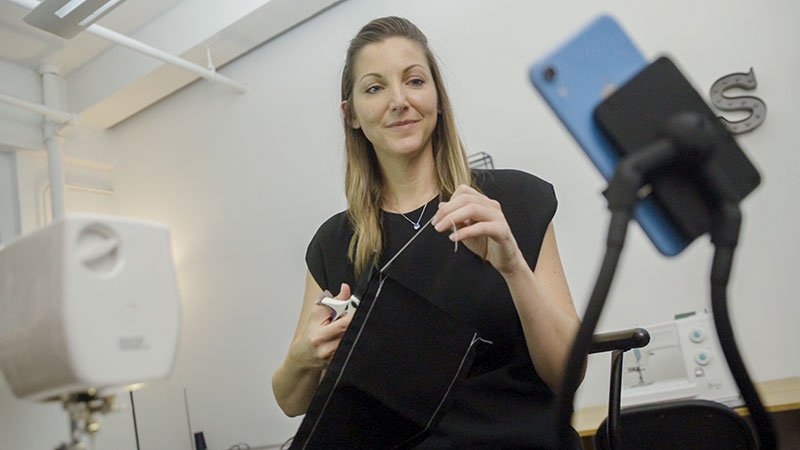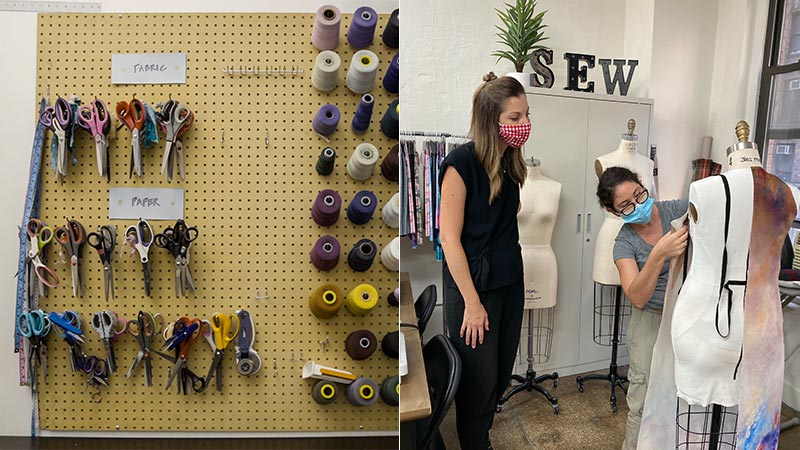This small business owner helped make 10,000 COVID-19 masks, free of charge
On Women's Entrepreneurship Day Visa celebrates Kristine Frailing for making a difference

Since 2014, the nineteenth of November marked Women’s Entrepreneurship Day to highlight and celebrate the efforts of millions of female business owners globally. Visa is proud to recognize entrepreneurs for their tenacity and passion in the face of COVID-19…like Kristine Frailing from New York City.
Kristine Frailing’s sewing school was humming along like a fine-tuned machine in early 2020. “It was such a busy time,” Frailing says. Indeed, the annual wave of upcoming weddings, proms and graduations, not to mention spring break, meant that classes at the New York Sewing Center in Manhattan’s Garment District were often filled to capacity.
And, just like that, they weren’t. COVID-19 shut it all down. The center closed on March 18, and Frailing had to let most of her staff go. But the 37-year-old designer and teacher quickly began formulating a revival plan. She converted in-person classes to virtual learning, practicing tutorials on Zoom with her manager.
“When you’re in class with students and teaching them how to start stitching, they can look over your shoulder,” Frailing says. “We had to rethink how we taught and the best ways to position the camera. We recorded classes in case students got stuck at home.”
Students were eager to support her, purchasing gift cards instead of demanding refunds and buying merchandise on her website. “It’s a family of really like-minded individuals who love a craft,” Frailing says. “I’m extremely grateful”.
An urgent need sparks a virtual leap
Inspired by that creative family, as well as doctors and nurses who needed masks to safely do their jobs, Frailing confronted the coronavirus and the shortage of face coverings head-on. “We decided to host a free online class teaching how to make a mask,” Frailing says. “It was a short, concise video. That was the first step into our virtual classes.”
It was, in fact, a giant professional leap. Her March 21 video post racked up more than 100,000 views in the first few days and currently has more than 195,000. Frailing received “tons of messages,” she says, from medical workers seeking masks and people eager to sew them. “That’s when we set in motion a distribution system for the masks,” says Frailing, who calls this accomplishment her proudest moment.
“This was a way to really impact the community through sewing at a terrible time,” she says. “People were sick and dying. Everyone felt this burden and sadness. People were stuck at home. We figured out a way to help and for them to do something important.”
Frailing estimates that sewers who took her free classes made 10,000 protective masks, which primarily went to New York hospitals. She keeps a constant reminder of her power to teach in her purse: a polka dot mask from a live video posted March 23.
Tapping into technology to expand reach
“We've been able to use technology to have a broader reach and help way more people,” Frailing says. “We used to run ads that appeared on Instagram, Google Ads and Facebook that only appealed to the local New York area. Since going virtual, we have a bigger client base. We advertise in all 50 states, and it’s paid off with new clients.
“Every time a student signs up for a class, we package and prep all the material, so it’s nice and easy when they arrive. We started shipping about a month after we closed.”
Frailing says having a well-designed website is key to her virtual success. Her top three tips for a site that clicks:
- It looks appealing and features intriguing imagery.
- It tells a story about the class, including what you’ll learn, what you’ll need, the dates and times and how long it will last.
- It makes it simple to pay. (Visit the Visa Small Business Hub to learn more about accepting online payments.)
Surviving, with an eye on thriving again
While Frailing’s business has been impacted, she recently was able to bring back three staffers. In July, the small business reopened for socially distanced in-person lessons. In the center’s two studio spaces there are hand sanitizers and thermometers for temperature scans. Face-to-face lessons comprise about 25 percent of the roster of classes while the remaining are online via Zoom.
Frailing, who learned to sew at age 8 from her great aunt and studied fashion design and merchandising at Missouri State University, in Springfield, believes sewing is about more than making clothes. “Sewing builds confidence,” she says. “There’s a lot of power in being able to accomplish something, and there’s also a therapy in using your hands and really creating things. My mission has always been to inspire people and empower people.”

The pandemic has empowered her. “The most exciting thing about being an entrepreneur is that you can be your boss and do something with meaning,” she says. “I built this business without any sort of loan. It was all from myself and one family member that I paid back.” During the pandemic, she applied for and received Paycheck Protection Program (PPP) funding and used it wisely.
“I have a survival mechanism I didn’t know was there,” she says. “And New York is where I always wanted to be — and it’s always been an exciting and challenging place to run a small business. We’ve learned so many new things and ways of doing things. I'm very excited for the future.”
Got a small business? Visit the Visa Small Business Hub for resources, tips, partner links and more.